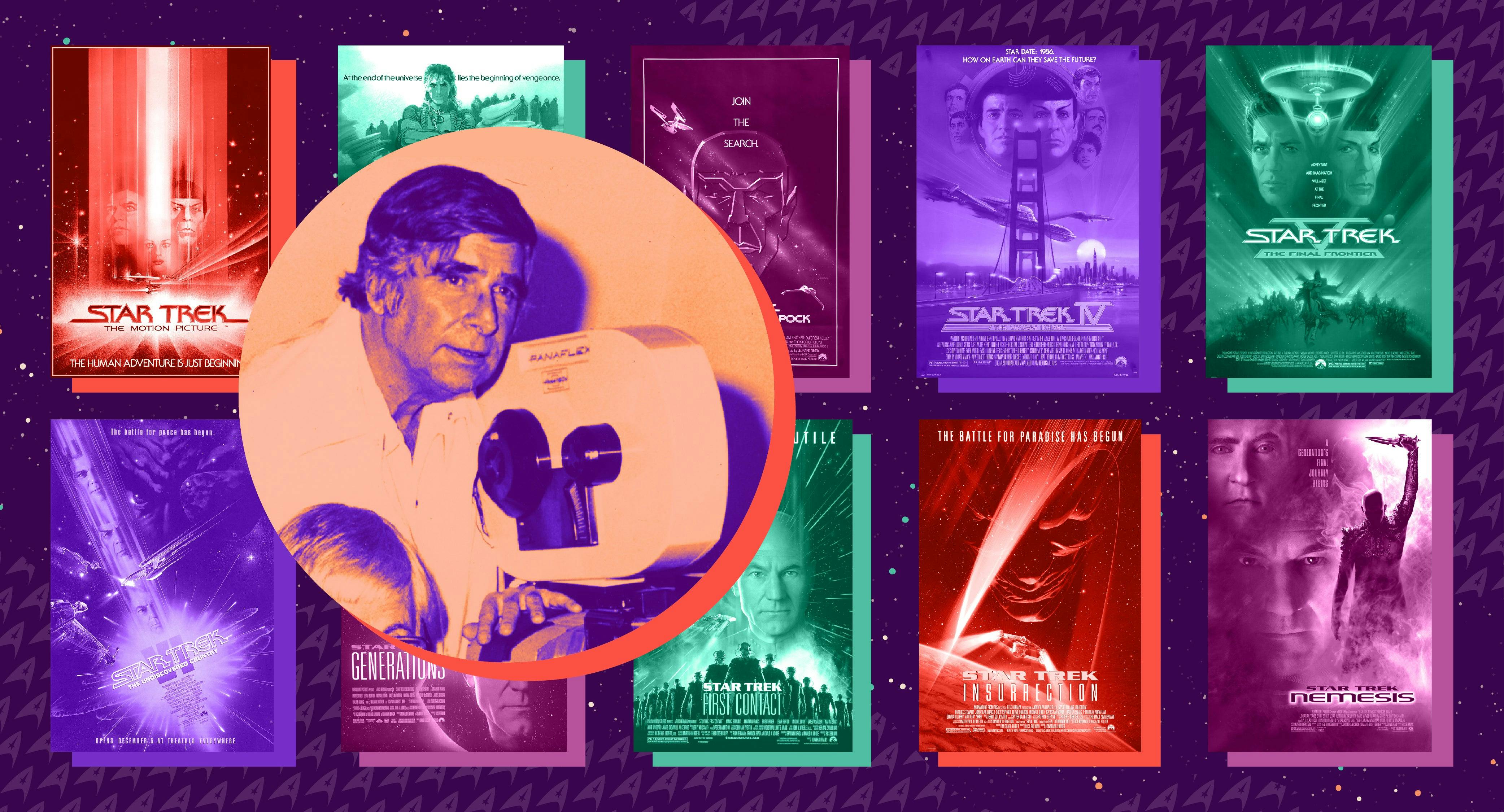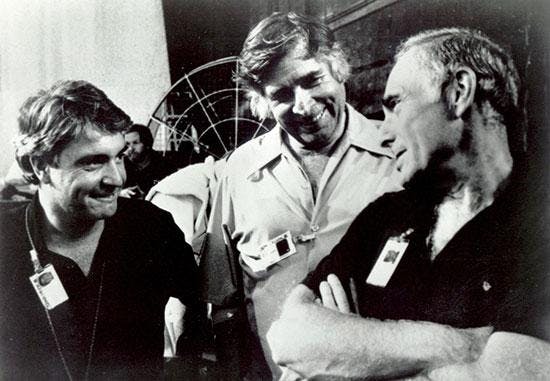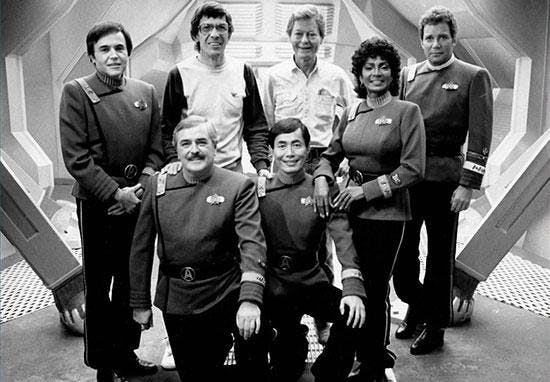Published Aug 19, 2022
The Many Roles of Gene Roddenberry
Today, we're looking at the legend in his role as Creative Consultant.

StarTrek.com | Getty Images
The 50th anniversary of Star Trek in 2016 marked a celebration of what began in the imagination of a single man — Eugene Wesley Roddenberry.
There have been articles, documentaries, and biographies that have tried to understand Trek’s enigmatic creator. Somehow, though, there is something most satisfying when we are able to hear directly from Roddenberry himself — through his own writings or interviews — when trying to gain an understanding of who he was as a person and artist at a given time of his life.
One source that sheds light on Roddenberry’s thoughts and feelings were his memos written during the time in his career when he became an executive consultant to Star Trek — the era between The Motion Picture and The Next Generation, from The Wrath of Khan to The Final Frontier.
Star Trek Shows Muslim Fans an Inclusive Future
It is easy to presume that Roddenberry’s title as “Executive Consultant” was somehow merely honorific; it wasn’t. He had served a similar role on The Animated Series, which was under the daily stewardship of Dorothy "D.C." Fontana.
Roddenberry took his role seriously, as the amount of writings and memos he drafted and sent to the producers, writers, and directors of the Star Trek movie sequels attest. While his opinions and thoughts were not always taken, they were always seriously considered — often resulting in line by line responses to his points. By exploring these Roddenberry memos and notes, it is apparent that Roddenberry cared about the future world he originated even if he wasn’t in charge of its day-to-day creation anymore.

StarTrek.com
A case in point is Roddenberry’s thoughts about the character of David Marcus from The Wrath of Khan. Following some memos about what Roddenberry considered less-important concerns (suggestions about jargon, for example), he crafted a 7-page, single-spaced memo dated September 30, 1981, to the attention of executive producer Harve Bennett, called, “SCRIPT COMMENTS — Items Considered Important.”
He began the memo by praising the script version created by Nicholas Meyer earlier that month, “First, let me say again how pleased I am with the number and quality of script improvements.” Among his comments about other characters like Lt. Saavik and Khan, and his concerns about the over-militarization of Starfleet, there are recommendations about the character of David Marcus.
At the time of Roddenberry's memos, the name “Marcus” had not yet been officially determined to be the last name for Carol and David; in fact, he used the original last name of “Manning” from earlier script drafts in his September memo. Roddenberry was concerned about several aspects of the David character. His primary concern was that he thought that a 23rd Century character as educated as David, raised by Carol and possessing “Kirk’s genes,” would not have a negative view of Starfleet as he does in the film. Roddenberry stated that David’s attitude towards Starfleet “causes me major concern.” To Roddenberry’s estimation, David “would not be capable of foolish and unsupported anti-military bias against Starfleet. There hasn’t been such a thing as a 'military mentality' around for over a century!”

Roddenberry crafted a lengthy suggestion around this problem by recommending that David start the film, instead, with conventional, pro-Starfleet attitudes. He could think that Starfleet’s “wanderer” nature wasn’t the only way to explore the universe, thereby setting up some contrast with Kirk’s more “boldly go” exploratory personality. But he should recognize the importance of Starfleet's humanitarian and exploratory mission. David could become angry at Starfleet, however, seeing it as not protecting him, his mother and friends, and his research after Khan’s attack. Where was Starfleet to stop Khan? This arc, Roddenberry suggested, has more verisimilitude to the universe he created. Roddenberry's view on that was not necessarily adhered to. However, another one of his concerns regarding David, specifically his dialogue and tendency to speak too much like a 20th Century person, even using common 20th Century swear-words, did have an effect — and much of that was removed from the film's script.
The September 30th memo was followed by another 10 pages on October 2nd, which demonstrated Roddenberry’s commitment to his role as a consultant. His comments showed how his thinking had evolved regarding Starfleet from the original show, and how that evolution would eventually affect his 24th Century creation, The Next Generation.
It is perhaps no surprise that Roddenberry, a writer his entire life, long before he sold his first professional script, would focus so much of his recommendations on the characters and their motivations. What it does show is that one of the reasons that Star Trek has endured over the past 50 years is that those who created it — beginning with Roddenberry and continuing with those who carried on his legacy, including Harve Bennett and Nicholas Meyer — cared very much about the characters and worlds of the future we love so much.
This article was originally published on December 5, 2016.
Maria Jose and John Tenuto are both sociology professors at the College of Lake County in Grayslake, Illinois, specializing in popular culture and subculture studies. The Tenutos have conducted extensive research on the history of Star Trek, and have presented at venues such as Creation Conventions and the St. Louis Science Center. They have written for the official Star Trek Magazine and their extensive collection of Star Trek items has been featured in SFX Magazine. Their theory about the “20-Year Nostalgia Cycle” and research on Star Trek fans has been featured on WGN News, BBC Radio and in the documentary The Force Among Us. They recently researched all known paperwork from the making of the classic episode "Space Seed" and are excited to be sharing some previously unreported information about Khan's first adventure with fellow fans. Contact the Tenutos at jtenuto@clcillinois.edu or mjtenuto@clcillinois.edu.
Stay tuned to StarTrek.com for more details! And be sure to follow @StarTrek on Facebook, Twitter, and Instagram.
